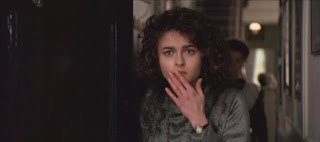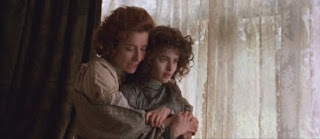“There is something peaceful and quiet about Howards End, starting with Vanessa’s haunting walk and introduction. To me, it feels like the essence of the British countryside, of elegance and that high class feeling that Brits always put in their period films. Howards End is, to me, James Ivory’s greatest achievement, such a delicate film, but with such power of acting and fascinating plot.”
Like him, I think of
Howards End as the best work from the Merchant Ivory team, and like him I think of its beginning with Vanessa Redgrave soon after I hear the name.
Howards End opens with a picturesque image of a woman walking through a green field near the eponymous Howards End. She, too, is clad in green, and though we don’t know it as yet this woman is the patron saint of Howards End (the film and the place). And though it opens with that image of Miss Redgrave, the story begins just after. An engagement impulsively arises and is broken just as swiftly. A bumbling aunt makes her way to a far off cottage, mistaken identities arise and harsh words ensue – and all this within the first ten minutes only. Yet, remove this preamble and
Howards End is no worse (or admittedly, no better) for it. Even though I was drawn to
Howards End on first viewing, it took a few more for me to appreciate the importance of this prologue and a few more for me to fully grasp the significance of Redgrave’s sombre walk through the field. And yet, the film isn’t really about Mrs. Wilcox. Like Forster’s original novel, it’s a story of class division in early 20th century England. There are the middle class Schlegels – booklovers and idealistically (if pedantically) good, the upper-class Wilcoxes – sometimes brittle and unrelenting but more than just caricatures and the lower class Basts – there are only two, but they’re just as important.
Howards End takes a look at the unlikely clash between these three different groups, and though it’s not a particularly subtle message (Forster’s novel is almost a complete allegory) it’s a pertinent one.
The name Merchant Ivory was in the nineties (and remains, but with less alacrity) a name indicative of good literary adaptations.
Howards End easily exists as my favourite. Screenwriter Ruth Prawer Jhabvala seems incredibly at ease adapting Forster to the screen, so that the machinations of these very “literary” characters never come across as unnatural. She does the same with
A Room With A View, another Forster novel, but this is in a class of its own. It’s interesting to note how much of Forster’s book (and actual lines) make it into Jhabvala finished script. The lines are as precise as few period pieces and sets up the chance for the actors to floor us with their deliveries, and they do – they really do. When Jose from the wildly insightful (but yet oddly hip)
Movies Kick Ass sent in his blurb I wondered “why review it?”…he essentially summed up what I loved about it….
“It’s impossible to watch this movie and avoid being haunted by the image of Vanessa Redgrave walking along a vast path of grass. The ethereal nature of this scene sets a strange mood over a film that so unsentimentally examines the clash of social classes and the creation of what was supposed to become modern England. Emma Thompson and Helena Bonham Carter (both subtly extraordinary) play sisters who come to represent different schools of thought at the beginning of the twentieth century. Anthony Hopkins and Samuel West are their male counterparts who also become symbols for the underlying themes E.M. Forster addressed in his brilliant novel. The miracle in the movie though is watching these symbols become human and witnessing how the film works as a wonderful political study and as an involving, intense emotional drama. Few movies master with such ease the dichotomy that exists between mind and heart; which can be fierce enemies or intimate friends.”
It’s the penultimate line above that jolts me in particular. In transferring a novel so rich in symbolism to the screen Ivory and company manage to avoid one of the unnerving possibilities – caricatures. Instead of the characters becoming symbols, the symbols turn into characters (it seems synonymous, but mull it over – it’s not)
Emma Thompson’s Oscar win for
Howards End remains as one of the most obviously good decisions the Academy has made in the Best Actress category. Her performance never fails to impress me upon subsequent viewings, even though to some degree it lies less in Thompson’s acting abilities (which are assuredly excellent) but in her ability to put the audience at ease. She’s only the de facto lead of the film (the main quarter are all given equal time for the most part) but it’s imperative for us to find Thompson’s Margaret to be a trustworthy, if simple, woman. Listening to Thompson recite her lines (and really, she doesn’t recite lines as much as she lives them) there is not the slightest trait of self-consciousness. Emma is so thoroughly Margaret we immediately believe her devotion to Helen – “what do I care Aunt Jules, Helen is in love – that’s all I need to know”. It’s one of her first lines and though it’s the beginning we already know all we need to about this woman.
Consider the words of Luke of
Journalistic Skepticism (don’t let the name fool you, he’s much to opleasant to be a cynic):
“Battling through the myth that Merchant Ivory films are overlong and overwrought, Howards End combines the immense talents of its cast, particularly the always-lovely Emma Thompson and the startlingly beautiful Helena Bonham Carter, with an impossibly elegant backdrop. It’s a gorgeous costume drama that never looks down on its audience, and Thompson’s performance is mannered loveliness.”
It’s a period piece, but that doesn’t make it any less “real”. Howards End is intent to presenting as precisely normal a world as possible and Emma manages to find nuances in even those most rote of lines and adds a dash of personality in the places we’d least expect. For example, I love a slight moment where Redgrave’s Mrs. Wilcox instructs her to write her name on the top of the woman’s Christmas list – Emma’s gleeful obedience is amusing and completely in keeping with her character. This is the sort of woman who grows up before her time, but still retains a bit of the silliness – willing to be pleased at being at the top of someone’s Christmas list.

It sets her in perfection opposition (I use the word loosely) to her sister, played excellently by Helena Bonham Carter – the Oscar snub heard around the world (so says me). Helen is just slightly more perverse than her sister, retaining a childish streak of meanness that can show itself at the most inopportune of moments, even when the lines don’t show it. A young lady looking for her husband at their home is given the tart response, “you’re welcome to search for him if you like” – added to Helena’s deadpan delivery and just the slightest trace of a smile playing on her lips makes it impossible for us to dislike her even as she adopts an almost ridiculous sense of pragmatism as the film reaches its close. It’s a fine line she treads, and in the same way that Emma avoids turning Margaret into someone we cannot love even as she does things we don’t care for, we still believe in Helena’s Helen even when we want to slap her. Perhaps more so. Her task is just as difficult as Emma – are people so devoted to the
cause? Helena makes it plausible.
It took me years to finally appreciate Anthony Hopkins, whom I now realise plays his role so excellently I subconsciously feel he’s giving a bad performance. True, it’s nowhere near as good as his
next alliance with Merchant Ivory, but he’s so subtle (blink and you’ll miss some of his expressions) I eventually realise he’s doing an excellent job. It’s not that the men are put on the backburner in
Howards End. In fact James Wilby and Samuel West play pivotal roles reaching to the core of their characters. West particularly is taxed with an almost unplayable and idealistic character (for some reason he reminds me of Lovborg in Hedda Gabler). But West is so willing to trudge on through the righteousness – that is not
self-righteous – I believe him even at his most dubious. Simple acts like refusing a substantial amount of money is more than just a pretentious act of gallantry, but a requisite to the character he’s carved and for someone who’s had her fair share of chivalrous leading men it’s no mean feat when I say that Helena has never seemed more at ease with a leading man. The scenes between the two bring a romanticism to the narrative that’s fittingly contrasted with the adulterous undertones and its firm opposition to the Anthony / Emma pairing.
Perhaps because it’s such a tribute to its trade
Howards End makes me write like I’m still in high school , but it’s obvious nonetheless that it is one that I love so.
“
Howards End is the second masterpiece from the Merchant-Ivory team (E/N
masterpiece #1,
masterpiece #3], working at the height of their creativity. Anyone expecting the dreamy romanticism of their first masterpiece,
A Room With A View, may be surprised at the complexity, subtlety and maturity of this drama. The luminous Emma Thompson, passionate Helena Bonham-Carter, and powerhouse Anthony Hopkins headline this tale of a country house, its meaning in the lives of its inhabitants, and its role in a series of misunderstandings that bring belated contentment to some, and ruin to others.
Gorgeous to look at, a dream to listen to, top-notch in all departments, this is intelligent film making at its best. Compelling and entertaining, it faithfully paints a tapestry of Forster's themes of love, class, family tradition, infidelity, and the yearning of artistic fulfillment. Vanessa Redgrave's supporting turn is but one of the film's many outstanding performances. I am also haunted by the symbolic image of a poor hanger-on literally crushed by his literary hopes and dreams. Howards End would sit proudly at the top of anyone's list of favorite films.”
It’s practically perfect in every way and so delicately made, it’s a pity many don’t even remember it. It’s #2 on my list of favourites, and really it’s interchangeable with the one to come since they’re both flawless, or thereabouts. (So, some of you would have discerned my obvious top choice.)
Do you care for Merchant Ivory? Do you care for Howards End? Speak up.









